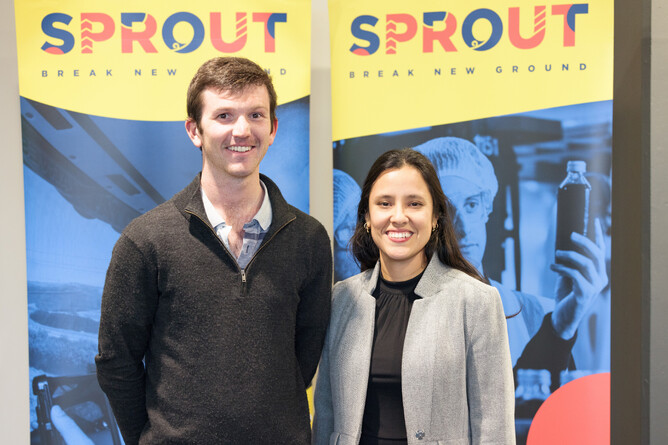Almost 60% of the fish meal produced globally is used in aquaculture feeds. It’s a market on the rise but relies on finite wild-marine resources and is considered by many as unsustainable.
One start-up company has its sights set on changing this with the help of insect meal and grape marc to create a more circular system.
Meet Natalia Bullon and Ben Pierce, co-founders of Tiaki Aquafeeds. They are one of the ventures taking part in our three-month Sprout 2023 Accelerator in the Cohort XI intake.
Tiaki - meaning to care, conserve, and produce -perfectly describes the core of their missions. They are developing feed ingredients and aquafeeds for aquaculture species to replace the currently used fish meals. Their focus is on creating a sustainable fishmeal alternative derived from insect meal and agricultural waste streams, creating a circular industry.
“We want to promote animal growth and performance with a focus on animal health and nutrition, just in a more eco-friendly, circular way,” said Natalia.
The duo, who describe themselves as open-minded, enthusiastic and ethical as a team come from complimenting backgrounds. Natalia, an almost PhD holder, brings the scientific nouse to the business with expertise in aquatic health and nutrition with a focus on diet formulation. Meanwhile Ben adds a business flare, coming from the farming side of the sector with extensive industry connections and experience.
Both are juggling jobs and lives outside of Tiaki Aquafeeds so being organised is a must. Google Calendar is a non-negotiable for them to keep track of meetings, along with the traditional physical diary and accounting software Hnry is helpful for keeping the dollars and cents sorted.
While the fishmeal industry is flourishing, it's not without its problems. One of those is a negative correlation between the demand for fishmeal and the availability of core ingredients.
“There is a limited variety of ingredients we can use in aquafeeds without compromising animal health and nutrition. The two key ingredients historically have been fish meal and fish oil - all aquatic animals require certain nutritional compounds derived from their habitat - but there's limited availability and it's unsustainable. Most fishmeal is made overseas, so for New Zealand, in the case of say, a pandemic, we are vulnerable,” said Natalia.
But with this vulnerability comes space for growth, which is where the idea for Tiaki Aquafeeds fits in.
“It’s been an interesting learning journey looking at ways you can incorporate marine derivatives - like taking land-based oil crops and genetically modifying them to produce some of those fish oils required,” said Ben.
Their business journey so far has involved a lot of research and learning. Ben jokes his most satisfying moment so far has been having his mind blown by the science on an almost daily basis. Natalia on the other hand has been embracing the creativity needed to get a business up and running and taking her work from the lab out into the world.
They’re not aiming small when it comes to their aspirations for the business. They want to promote a more sustainable global aquaculture industry through their circular model. But first, they need to test their product on farms.
“Our next step is connecting with farmers to participate in a trial run of our feeds and see how they work in the real world,” said Natalia.
The duo are excited to be taking part in this Sprout Accelerator and drawing on the advice from the mentor (and fellow founders).
“One area we are hoping Sprout can help is in the commercialisation of our product and finding out where the dollar value is in it. There are lots of little things that we’ve struggled to get our heads around or even prioritised. We are at a point now where we need to shift focus from the product itself to the business.” said Ben.
Relishing in how far they’ve come, and excited by the road ahead they are driven by a desire to see the aquaculture industry in New Zealand thriving and resilient to ensure its success for future generations.

